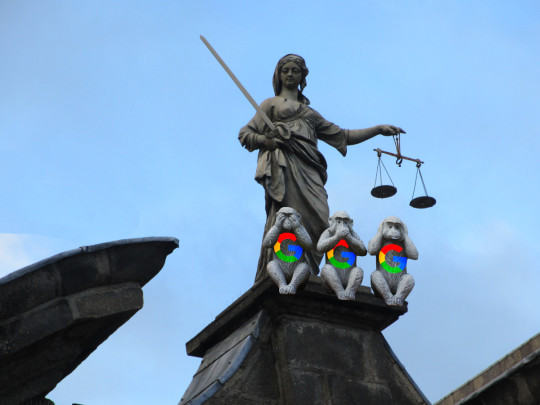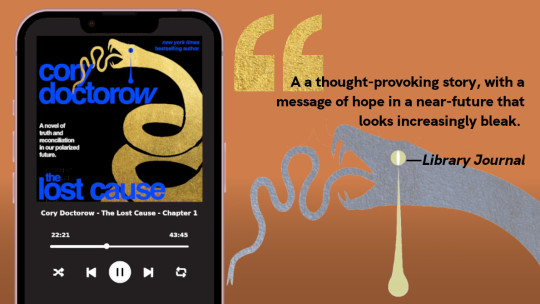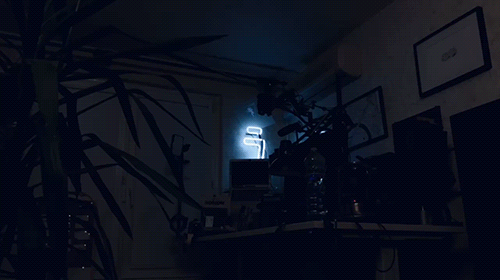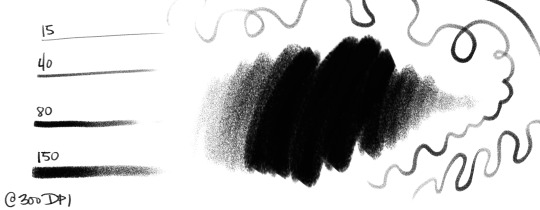#opacity
Text
How Google’s trial secrecy lets it control the coverage

I'm coming to Minneapolis! Oct 15: Presenting The Internet Con at Moon Palace Books. Oct 16: Keynoting the 26th ACM Conference On Computer-Supported Cooperative Work and Social Computing.

"Corporate crime" is practically an oxymoron in America. While it's true that the single most consequential and profligate theft in America is wage theft, its mechanisms are so obscure and, well, dull that it's easy to sell us on the false impression that the real problem is shoplifting:
https://newrepublic.com/post/175343/wage-theft-versus-shoplifting-crime
Corporate crime is often hidden behind Dana Clare's Shield Of Boringness, cloaked in euphemisms like "risk and compliance" or that old favorite, "white collar crime":
https://pluralistic.net/2021/12/07/solar-panel-for-a-sex-machine/#a-single-proposition
And corporate crime has a kind of performative complexity. The crimes come to us wreathed in specialized jargon and technical terminology that make them hard to discern. Which is wild, because corporate crimes occur on a scale that other crimes – even those committed by organized crime – can't hope to match:
https://pluralistic.net/2021/10/12/no-criminals-no-crimes/#get-out-of-jail-free-card
But anything that can't go on forever eventually stops. After decades of official tolerance (and even encouragement), corporate criminals are finally in the crosshairs of federal enforcers. Take National Labor Relations Board general counsel Jennifer Abruzzo's ruling in Cemex: when a company takes an illegal action to affect the outcome of a union election, the consequence is now automatic recognition of the union:
https://pluralistic.net/2023/09/06/goons-ginks-and-company-finks/#if-blood-be-the-price-of-your-cursed-wealth
That's a huge deal. Before, a boss could fire union organizers and intimidate workers, scuttle the union election, and then, months or years later, pay a fine and some back-wages…and the union would be smashed.
The scale of corporate crime is directly proportional to the scale of corporations themselves. Big companies aren't (necessarily) led by worse people, but even small sins committed by the very largest companies can affect millions of lives.
That's why antitrust is so key to fighting corporate crime. To make corporate crimes less harmful, we must keep companies from attaining harmful scale. Big companies aren't just too big to fail and too big to jail – they're also too big for peaceful coexistence with a society of laws.
The revival of antitrust enforcement is such a breath of fresh air, but it's also fighting headwinds. For one thing, there's 40 years of bad precedent from the nightmare years of pro-monopoly Reaganomics to overturn:
https://pluralistic.net/ApexPredator
It's not just precedents in the outcomes of trials, either. Trial procedure has also been remade to favor corporations, with judges helping companies stack the deck in their own favor. The biggest factor here is secrecy: blocking recording devices from courts, refusing to livestream the proceedings, allowing accused corporate criminals to clear the courtroom when their executives take the stand, and redacting or suppressing the exhibits:
https://prospect.org/power/2023-09-27-redacted-case-against-amazon/
When a corporation can hide evidence and testimony from the public and the press, it gains broad latitude to dispute critics, including government enforcers, based on evidence that no one is allowed to see, or, in many cases, even describe. Take Project Nessie, the program that the FTC claims Amazon used to compel third-party sellers to hike prices across many categories of goods:
https://www.wsj.com/business/retail/amazon-used-secret-project-nessie-algorithm-to-raise-prices-6c593706
Amazon told the press that the FTC has "grossly mischaracterize[d]" Project Nessie. The DoJ disagrees, but it can't say why, because the Project Nessie files it based its accusations on have been redacted, at Amazon's insistence. Rather than rebutting Amazon's claim, FTC spokesman Douglas Farrar could only say "We once again call on Amazon to move swiftly to remove the redactions and allow the American public to see the full scope of what we allege are their illegal monopolistic practices."
It's quite a devastating gambit: when critics and prosecutors make specific allegations about corporate crimes, the corporation gets to tell journalists, "No, that's wrong, but you're not allowed to see the reason we say it's wrong."
It's a way to work the refs, to get journalists – or their editors – to wreathe bold claims in endless hedging language, or to avoid reporting on the most shocking allegations altogether. This, in turn, keeps corporate trials out of the public eye, which reassures judges that they can defer to further corporate demands for opacity without facing an outcry.
That's a tactic that serves Google well. When the company was dragged into court by the DoJ Antitrust Division, it demanded – and received – a veil of secrecy that is especially ironic given the company's promise "to organize the world's information and make it universally accessible and useful":
https://usvgoogle.org/trial-update-9-22
While this veil has parted somewhat, it is still intact enough to allow the company to work the refs and kill disfavorable reporting from the trial. Last week, Megan Gray – ex-FTC, ex-DuckDuckGo – published an editorial in Wired reporting on her impression of an explosive moment in the Google trial:
https://pluralistic.net/2023/10/03/not-feeling-lucky/#fundamental-laws-of-economics
According to Gray, Google had run a program to mess with the "semantic matching" on queries, silently appending terms to users' searches that caused them to return more ads – and worse results. This generated more revenue for Google, at the expense of advertisers who got billed to serve ads that didn't even match user queries.
Google forcefully disputed this claim:
https://twitter.com/searchliaison/status/1709726778170786297
They contacted Gray's editors at Wired, but declined to release all the exhibits and testimony that Gray used to form her conclusions about Google's conduct; instead, they provided a subset of the relevant materials, which cast doubt on Gray's accusations.
Wired removed Gray's piece, with an unsigned notice that "WIRED editorial leadership has determined that the story does not meet our editorial standards. It has been removed":
https://www.wired.com/story/google-antitrust-lawsuit-search-results/
But Gray stands by her piece. She admits that she might have gotten some of the fine details wrong, but that these were not material to the overall point of her story, that Google manipulated search queries to serve more ads at the expense of the quality of the results:
https://twitter.com/megangrA/status/1711035354134794529
She says that the piece could and should have been amended to reflect these fine-grained corrections, but that in the absence of a full record of the testimony and exhibits, it was impossible for her to prove to her editors that her piece was substantively correct.
I reviewed the limited evidence that Google permitted to be released and I find her defense compelling. Perhaps you don't. But the only way we can factually resolve this dispute is for Google to release the materials that they claim will exonerate them. And they won't, though this is fully within their power.
I've seen this playbook before. During the early months of the pandemic, a billionaire who owned a notorious cyberwarfare company used UK libel threats to erase this fact from the internet – including my own reporting – on the grounds that the underlying research made small, non-material errors in characterizing a hellishly complex financial Rube Goldberg machine that was, in my opinion, deliberately designed to confuse investigators.
Like the corporate crimes revealed in the Panama Papers and Paradise Papers, the gambit is complicated, but it's not sophisticated:
Make everything as complicated as possible;
Make everything as secret as possible;
Dismiss any accusations by claiming errors in the account of the deliberately complex arrangements, which can't be rectified because the relevant materials are a secret.

If you'd like an essay-formatted version of this post to read or share, here's a link to it on pluralistic.net, my surveillance-free, ad-free, tracker-free blog:
https://pluralistic.net/2023/10/09/working-the-refs/#but-id-have-to-kill-you


My next novel is The Lost Cause, a hopeful novel of the climate emergency. Amazon won't sell the audiobook, so I made my own and I'm pre-selling it on Kickstarter!

Image:
Jason Rosenberg (modified)
https://www.flickr.com/photos/underpants/12069086054/
CC BY
https://creativecommons.org/licenses/by/2.0/
--
Japanexperterna.se (modified)
https://www.flickr.com/photos/japanexperterna/15251188384/
CC BY-SA 2.0:
https://creativecommons.org/licenses/by-sa/2.0/
#pluralistic#secrecy#opacity#google#antitrust#trustbusting#wired#working the refs#megan grey#semantic matching
2K notes
·
View notes
Text


[ FREE CLIP STUDIO BRUSHES ]
Grimm Brush Set - https://assets.clip-studio.com/en-us/detail?id=1931120
#free#free brushes#free clip studio paint brushes#free clip studio paint#shading#soft#brushes#softbrush#illustration#opacity#hair#lineart#paint#csp#csp brushes#csp resources#csp ex#csp resource#detail#details#sketch#pencil#sketching#ペン#storybook#Horror#rough#stipple#hatching#Crosshatching
44 notes
·
View notes
Text
VB: Once, after listening to a text of mine mixing French and English, a first-year US student said reproachfully: “I didn’t understand the parts in French; I felt alienated.” I replied something like: “Relax! It’s okay, and liberating, not to understand sometimes and to realize that reality escapes in the form of languages one doesn’t know.” It’s also humbling to know that myriads of unknown or unidentified languages construct alternative realities. So, yes, there’s a need to reassert that opacité can be generative, totally! On the purely editorial side: Mosadeq pushed us to publish Recovery with some French in it, just like Récupérer had some English. The “tests” were written directly in English.
EM: Understanding is vastly overrated! For one thing, it can make us stick with what we already know or “almost know”—that is, what coincides with our prejudices—and where’s the fun in that? I prefer the lostness, the sense of reinventing myself, that comes from reading cacophonically polylingual texts such as Recovery. These texts meet me where I actually “am,” where I am “being.” Can you comment on queer practice and its relation to translation, even within one language? Does being gay/queer/lesbo—as we both and each are—have an attentional effect on writing and language practice that makes verisimilitude already always suspect?
VB: Although some say that queerness doesn’t change anything of the writing experience, I think that practicing opacité is in part linked with the experience of not fitting in because I’m gay/queer and often reminded that I don’t belong. Plus, there are things about queer desire—however that absolute singular and the singularity of that desire are antithetical to each other—and queer practices of total exhibition of the self while hiding it that fundamentally change our relation to fidelity, to the shifty contexts of language and languages, and to the way we build new techniques of the body for ourselves. Part of my writing comes from a fundamental need to make cheer because we’ve been and sometimes still are so close to the catastrophic social and mental consequences of being other. We’ve been through the melancholy of refusal, and so the urge is to free oneself from intimidations and intimations. Making cheer means a politics, questioning verisimilitude, finding ways to continue the fluidity that inhabits us, whoever we are.
Vincent Broqua Interviewed by Erín Moure, A book and its translation engage in a “serious lightness” across languages and categories.
32 notes
·
View notes
Text

#desk#setup#desk setup#my desk#my workplace#workplace#workshop#lab#studio#home studio#neon#neon sign#ra#ラ#logo#logotype#self branding#brand#opacity.ru#opacity#design#art#digital art#home#sci-fi#high tech#cyberpunk
33 notes
·
View notes
Text

#Grid#Blocks#Glass#Morning Light#Transparent#Opacity#Like Water#photography#photography on tumblr#original photography#photo blog#snapshot
10 notes
·
View notes
Quote
We don’t want more transparency or more democracy. There is quite enough of both. On the contrary, we want more opacity and more intensity
Tiqqun, The Cybernetic Hypothesis, pg. 91
89 notes
·
View notes
Text
Introducing DIY Dark Dan Phantom; this unit can hold at least 10 tons of trauma 👻


#zeigarian#digital art#artists on tumblr#fan art#dannyphantom#Danny phantom#Dan phantom#Ghost#Spooky#Danny phantom fanart#Ghost art#Fyp#fypツ#Vlad plasmius#Vlad masters#Dark Dan phantom#Nickelodeon#Opacity#Transparent#Fan art
132 notes
·
View notes
Text
I am thus making an argument for limit consent, a type of consent that is conceptually grounded in negative dialectics. Affirmative consent emerges out of the tradition of reading the Hegelian dialectic as giving us an ethic of recognition, wherein wishes and boundaries are communicated and negotiated, recognizing each other's needs so as to reach a syntheic conclusion (for example, what kind of sexual contact both are assenting to). But in this volume, I explore a different ethical terrain than the one we are accustomed to, which arises in the confrontation with the irreducible opacity in oneself and in the other. Where affirmative consent imagines a subject that can be fully transparent to herself, the kind of psychoanalysis you will find in this volume acknowledges that the self cannot be fully known, that we are always somewhat opaque to ourselves, and, therefore, that consent negotiations always involve more than we think we bargained for: they involve the confrontation with what is irreducibly alien to us about ourselves.
Avgi Saketopoulou, Sexuality Beyond Consent
What I appreciate about Saketopoulous's work, and what distinguishes her from so many analysts, is her humility. Her philosophy: You don't know yourself, and the analyst doesn't know you, either.
This is in no way an invitation to jettison affirmative consent in sexual encounters, nor to minimize harm from sexual assault. That would be totally contrary to this philosophy. Sexual assault is about one person trampling the other's subjectivity; this approach is about having some sort of awareness of or even reverence for the unknowable in the deep subjectivity of the other. Acknowledgement of this human fact requires us to assume even more responsibility for the consequences of our behaviors on others.
Avgi writes that "consent is an inside job." I find that the psychological response to both sexual assault and the Me Too response to sexual assault, and even the psychological response tot the "sex positive" movement itself, can be a desire to make desire and behavior simple, explainable, and justifiable to the community. This denies us our complex sexual agency, and the energy that emanates from opacity. I love this book as an intervention which opens us up to inquire, with humility and curiosity, about the complex worlds within us.
#avgi saketopoulou#sexuality beyond consent#hegelian dialectic#affirmative consent#opacity#psychoanalysis#cw sa
5 notes
·
View notes
Note
Navy! Would you ever consider making this a full story or retold version of howling commandos?
https://at.tumblr.com/navybrat817/from-the-howling-commandos-fic/rfcw8ydklmjn
Hi, nonnie. I would consider it! I would probably switch out tattoo artist though, simply because I have my Howling Commandos Tattoo Bucky and I have Sin on Skin* Bucky.
*Sin on Skin is what I'm calling the AU for Sugar and Spice and A Sunny Outlook (others to be added).
But definitely Bucky with tattoos. 🔥
Edit by Nix.

Love and thanks! 💙
#navybrat answers#sweet ask#fic ask#opacity#bucky barnes#tattoo!bucky barnes#howling commandos tattoo au#sin on skin au#anon ask#sending love ❤️#asks are always appreciated#nix#nix akimbo#nixakimbo#nix edit#nix akimbo edit#nixakimbo edit
16 notes
·
View notes
Text

🔵 𝙚 𝙫 𝙞 𝙙 𝙚 𝙣 𝙘 𝙚 🔵
𝚂𝚝𝚊𝚛𝚒𝚗𝚐 𝚘’𝚎𝚛 𝚝𝚑𝚎 𝚏𝚎𝚗𝚌𝚎,
𝚒𝚗𝚝𝚘 𝚝𝚑𝚎 𝚏𝚒𝚎𝚕𝚍 𝚘𝚏 𝚊𝚕𝚕 𝚖𝚢 𝚙𝚊𝚜𝚝 𝚍𝚎𝚜𝚒𝚛𝚎𝚜
𝙸 𝚏𝚎𝚎𝚕 𝚝𝚑𝚎𝚒𝚛 𝚠𝚊𝚛𝚖𝚝𝚑, 𝚊 𝚍𝚒𝚜𝚝𝚊𝚗𝚝 𝚑𝚎𝚊𝚝,
𝚜𝚝𝚒𝚕𝚕 𝚋𝚎𝚊𝚞𝚝𝚒𝚏𝚞𝚕 𝚕𝚒𝚔𝚎 𝚋𝚊𝚕𝚎𝚜 𝚘𝚗 𝚏𝚒𝚛𝚎
#filmmaking#music video#synthwave#liminal#lyrics#macbook#finalcutpro#opacity#overlay#woods#woodland#dreamy#dreamcore#editing#night#workingatnight#work in progress#spooky#folktronica#duet#our dark duet#office#night office#dark aesthetic#dark
2 notes
·
View notes
Text
The internet is not a (link)dump truck

Monday (October 2), I'll be in Boise to host an event with VE Schwab. On October 7–8, I'm in Milan to keynote Wired Nextfest.

The second decade of the 21st century is truly a bounteous time. My backyard has produced a bumper crop of an invasive species of mosquito that is genuinely innovative: rather than confining itself to biting in the dusk and dawn golden hours, these stinging clouds of flying vampires bite at every hour that God sends:
https://themagnet.substack.com/p/the-magnet-081-war-with-mosquitoes
Here in the twilight of capitalism's planet-devouring, half-century orgy of wanton destruction, there's more news every day than I can possibly write a full blog post about every day, and as with many weeks, I have arrived at Saturday with a substantial backlog of links that didn't fit into the week's "Hey look at this" linkdumps.
Thus, the eighth installment in my ongoing, semiregular series of Saturday linkdumps:
https://pluralistic.net/tag/linkdump/
This week, the miscellany begins with the first hesitant signs of an emerging, post-neoliberal order. The FTC, under direction of the force-of-nature that is Lina Khan, has brought its long-awaited case antitrust case against Amazon. I am very excited about this. Disoriented, even.
When was the last time you greeted every day with a warm feeling because high officials in the US government were working for the betterment of every person in the land? It's enough to make one giddy. Plus, the New York Times let me call Amazon "the apex predator of our platform era"! Now that it's in the "paper of record," it's official:
https://pluralistic.net/ApexPredator
Now, lefties have been predicting capitalism's imminent demise since The Communist Manifesto, but any fule kno that the capitalist word for "crisis" also translates as "opportunity." Like the bedbugs that mutated to thrive in clouds of post-war DDT, capitalism has adapted to each crisis, emerging in a new, more virulent form:
https://boingboing.net/2023/09/30/bedbugs-take-paris.html
But "anything that can't go on forever will eventually stop" (Stein's Law). Perhaps our mistake was in waiting for capitalism to give way to socialism, rather than serving as a transitional phase between feudalism and…feudalism.
What's the difference between feudalism and capitalism? According to Yanis Varoufakis, it comes down to whether we value rents (income you get from owning things) over profits (income you get from doing things):
https://pluralistic.net/2023/09/28/cloudalists/#cloud-capital
By that metric, the FTC's case against Amazon is really a case against feudalism. Through predatory pricing and acquisitions, Amazon has turned itself into a chokepoint that every merchant, writer and publisher has to pass through in order to reach their customers. Amazon charges a fortune to traverse that chokepoint (estimates range from 45% to 51% of gross revenues) and then forces sellers to raise their prices everywhere else when they hike their Amazon prices so they can afford Amazon's tolls. It's "an economy-wide hidden tax":
https://www.thebignewsletter.com/p/the-ftc-sues-to-break-up-amazon-over
Now, feudalism isn't a straightforward proposition. Like, are you sure you mean feudalism? Maybe you mean "manorialism" (they're easy to mix up):
https://locusmag.com/2021/01/cory-doctorow-neofeudalism-and-the-digital-manor/
Plus, much of what we know about the "Dark Ages" comes from grifter doofuses like Voltaire, a man who was capable of dismissing the 800 year Holy Roman Empire with a single quip ("neither holy, roman, nor an empire"). But the reality is a lot more complicated, gnarly and interesting.
That's where medievalist Eleanor Janeaga comes in, and her "Against Voltaire, or, the shortest possible introduction to the Holy Roman Empire" is a banger:
https://going-medieval.com/2023/09/29/against-voltaire-or-the-shortest-possible-introduction-to-the-holy-roman-empire/
Now, while it's true that Enlightenment thinkers gave medieval times a bum rap, it's likewise true that a key element of Enlightenment justice is transparency: justice being done, and being seen to be done. One way to distinguish "modern" justice from "medieval" trials is to ask whether the public is allowed to watch the trial, see the evidence, and understand the conclusion.
Here again, there is evidence that capitalism was a transitional phase between feudalism and feudalism. The Amazon trial has already been poisoned by farcical redactions, in which every key figure is blacked out of the public record:
https://prospect.org/power/2023-09-27-redacted-case-against-amazon/
This is part of a trend. The other gigantic antitrust case underway right now, against Google, has turned into a star chamber as well, with Judge Amit P Mehta largely deferring to Google's frequent demands to close the court and seal the exhibits:
https://usvgoogle.org/trial-update-9-22
Google's rationale for this is darkly hilarious: if the public is allowed to know what's happening in its trial, this will be converted into "clickbait," which is to say, "The public is interested in this case, and if they are informed of the evidence against us, that information will be spread widely because it is so interesting":
https://www.bigtechontrial.com/p/secrecy-is-systemic
Thankfully, this secrecy is struggling to survive the public outrage it prompted. While the court's Zoom feed has been shuttered and while Judge Mehta is still all-too-willing to clear the courtroom during key testimony, at least the DoJ's exhibits aren't being sealed at the same clip as before:
https://www.theverge.com/2023/9/27/23892215/google-search-antitrust-trial-documents-public-again-judge-mehta-rules
In 2023, the world comes at you fast. There's an epic struggle over the future of corporate dominance playing out all around us. I mean, there are French antitrust enforcers kicking down doors of giant tech companies and ransacking their offices for evidence of nefarious anticompetitive plots:
https://www.theverge.com/2023/9/28/23894863/nvidia-offices-raided-french-competition-authority
As ever, the question is "socialism or barbarism." But don't say that too loud: in America, socialism is a slur, one that dates back to the Reconstruction era, when pro-slavery factions called Black voting "socialism in South Carolina."
Ever since, white nationalists used "socialism" make Americans believe that "socialism" was an "extremist" view, so they'd stand by while everyone from Joe McCarthy to Donald Trump smeared their opponents as "Marxists":
https://thehill.com/homenews/campaign/4066499-trump-paints-2024-campaign-as-righteous-crusade/
As Heather Cox Richardson puts it for The Atlantic, "There is a long-standing fight over whether support for the modern-day right is about taxes or race. The key is that it is about taxes and race at the same time":
https://www.theatlantic.com/ideas/archive/2023/09/american-socialism-racist-origins/675453/
The cruelty isn't the point, in other words. Cruelty is the tactic. The point is power. Remember, no war but class war. All of this is in service to paying workers less so that bosses and investors can have more.
Take "essential workers," everyone from teachers to zookeepers, nurses to librarians, EMTs to daycare workers. All of these "caring" professions are paid sub-living wages, and all of these workers are told that "they matter too much to earn a living wage":
https://www.okdoomer.io/praise-doesnt-pay/
The "you matter too much to pay" mind-zap is called "vocational awe," a crucial term introduced by Ettarh Fobazi in her 2018 paper:
https://www.inthelibrarywiththeleadpipe.org/2018/vocational-awe/
Vocational awe is how creative workers – like the writers who just won their strike and the actors who are still fighting – are conned into working at starvation wages. As the old joke goes, "What, and give up show-business?"
https://ask.metafilter.com/117904/Whats-the-joke-thas-hase-the-punchline-what-and-give-up-show-business
In this moment of Big Tech-driven, AI-based wage suppression, mass surveillance, corruption and inequality, perhaps we should take a moment to remind ourselves that cyberpunk was a warning, not a suggestion. Or, more to the point, the warning was about high-tech corporate takeover of our lives, and the suggestion was that we could seize the means of computation (a synonym for William Gibson's "the street finds its own use for things"):
http://www.seizethemeansofcomputation.org/
We are living in a lopsided cyberpunk future, long on high-tech corporate takeover, short of computation seizing. This point is made sharply in JWZ's "Dispatch From The Cyberpunk City," which is beautifully packaged as a Hypercard stack that you run on an in-browser Mac Plus emulator from the Internet Archive:
https://www.jwz.org/blog/2023/09/neuroblast-dispatch-from-the-cyberpunk-city/
Cast your gaze ahead, to the near future: Public space has all but disappeared. Corporate landlords use AI-powered robots to harass the homeless. The robots, built slick and white with an R2-D2 friendliness now most resemble giant butt plugs covered in graffiti and grime.
Science fiction doesn't have to be a warning. It can also be a wellspring of hope. That's what I tried to do with The Lost Cause, my forthcoming Green New Deal novel, which Bill McKibben called "The first great YIMBY novel":
https://us.macmillan.com/books/9781250865939/the-lost-cause
Writing a hopeful novel of ecological, social and economic redemption, driven by solidarity, repair, and library socialism, was a powerful tonic against despair in this smoke-smothered, flooded, mosquito-bitten time. And while the book isn't out yet, there are early indications I succeeded, like Kim Stanley Robinson's reaction, "Along with the rush of adrenaline I felt a solid surge of hope. May it go like this."
And now, we have a concurring judgment from The Library Journal, who yesterday published their review, which concludes: "a thought-provoking story, with a message of hope in a near-future that looks increasingly bleak":
https://www.libraryjournal.com/review/the-lost-cause-2196385

If you'd like an essay-formatted version of this post to read or share, here's a link to it on pluralistic.net, my surveillance-free, ad-free, tracker-free blog:
https://pluralistic.net/2023/09/30/mesclada/#melange
#pluralistic#antitrust#amazon#opacity#impunity#vocational awe#cyberpunk#dystopia watch#hypercard#jwz#holy roman empire#voltaire#enlightenment#dark ages#history#eleanor janega#linkdump#linkdumps#the lost cause#science fiction#books
170 notes
·
View notes
Photo




[ FREE CLIP STUDIO BRUSHES ]
Shading Soft Paint - https://assets.clip-studio.com/en-us/detail?id=1982901
Rough Graphite Pen - https://assets.clip-studio.com/en-us/detail?id=1982810
Sketch Chalk Brush - https://assets.clip-studio.com/en-us/detail?id=1982190
Brave's Soft Graphite Updated - https://assets.clip-studio.com/en-us/detail?id=1982383
#free#free brushes#free clip studio paint brushes#free clip studio paint#shading#soft#brushes#softbrush#illustration#opacity#hair#lineart#paint#csp#csp brushes#csp resources#csp ex#csp resource#detail#details#shadow#semitransparent#doodle#sketch#background#pencil#sketching#chalk#graphite#ペン
105 notes
·
View notes
Text

Rule 4: Use the previous poem as a puppet and rewrite it from the perspective of Rainer Maria Rilke’s puppeteer angel in the fourth Duino Elegy by Katrine Øgaard Jensen
From: When the Beginning Feels Like an Ending, There Are Signs: A Series of Mistranslations.
2 notes
·
View notes
Text
youtube
2 notes
·
View notes
Photo

Beach birds winging their way over the lustrous liquid silver of the Gosthani River.
The glare here is so intense and must be borne by these birds for such sustained stretches, essentially the entire day, that one marvels these birds do not develop an avian version of snow blindness!!.
We need sunlight to see but sunlight is also detrimental to sight!!!. The ultraviolet rays present in it can cause an opacity of the eye lens - cataract - a serious matter considering that this causes blindness in about 25 million people worldwide. And if there is one species that truly needs ultra-sharp vision for its livelihood it is the high-flying bird!!! Birds don’t peer!!!.
The UV glare from the mobile mirror-like surface of these water apparently cause photo-oxidation of the crystalline proteins in the eye lens, not to mention the generation of superoxide and other reactive oxygen species that do further damage.That the eye lens contains one of the highest concentrations of the antioxidant Ascorbic Acid does not now surprise us!!!
The eye lens is especially vulnerable not only because its proteins are held at super-saturation, making them very vulnerable to precipitation by any chemical or mechanical injury, but in addition do not undergo any molecular or cellular turnover. The lens proteins you are born with are all that you will have for life, and upon reflection it is little short of a molecular miracle that they stay clear and crystalline as long as they do - seven decades.
Cataracts due to relentless sun exposure and glare while out at sea in low-lying boats - that shortens the distance between the shiny surface and the eye - beset the 50,000 fisherman of Srikakulam district - about 130 kilometers from here - many of whom develop lens opacities in their forties precluding many of them then from making a living, a serious matter in a people who essentially live from hand-to-mouth..
How these birds - doubtless long-lived, and fishermen in their own right!! - manage to keep their eyes and vision intact over a lifetime - assuming they do, they well might not - is a puzzle that needs explication.
The puzzle is further accentuated by the fact that reflected light is mostly polarized light, and as the pharmaceutical industry has known for a long time, polarized light is far more potent in producing molecular damage than un-polarized light.
May 10, 2010, Gosthani River confluence, Bheemili, Visakhapatnam, Andhra Pradesh.
#cataract#fishermen#opacity#eye lens#srikakulam#tryptophan#photooxidation#supersaturation#crystalline proteins#ultraviolet#glare#snow blindness#beach birds#avian#vision#reflection#catoptric#polarized light#superoxide#reactive oxygen species#antioxidant#ascorbic acid#reflectivity#andhra pradesh
3 notes
·
View notes